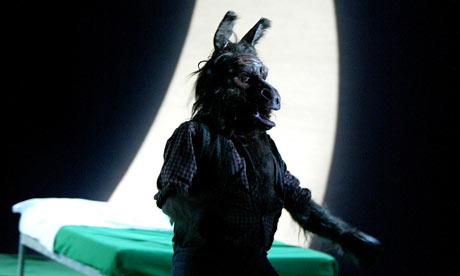
Pepys described it as "the most insipid ridiculous play I ever saw". Chesterton thought it "a greater psychological triumph than Hamlet". Coleridge believed that Shakespeare had conceived the whole play as a dream: it is of course A Midsummer Night's Dream, fondly known in theatrical circles simply as the Dream.
If it's a dream, it's the kind that's close to poetry. Admittedly, Shakespeare's language is not particularly poetic, but the action is: the echoes, dualities, oppositions and resolutions are like a cross-section through poetic structure. And the power of imagination is its major theme.
This week's honorary poem is one of the more highly-wrought speeches, and one of the most widely-quoted. It is the speech made by Theseus, Duke of Athens, at the beginning of Act V: "More strange than true: I never may believe/ These antique fables and these fairy toys." By now, all the magical mayhem has been resolved, and a triple wedding is in view – including that of Theseus himself to Queen of the Amazons, Hippolyta. It is time to submit the moonlit creative underworld to clear thinking.
Theseus is the rational man in the play. His correlation of poetry with eye-rolling frenzy, lifted from context, was later to nourish the Romantic view of inspiration, and influences the popular view of poets and poetry to this day, but the speech is hardly a paean to creativity. Theseus is loftily amused, if not downright mocking. "The lunatic, the lover and the poet/ Are of imagination all compact." The speech has an ironical framework, of course, provided by the play itself: the whole development has been governed by the antics of beings unknown to rational thought, after all. But Theseus (he would have us believe) would never suppose a bush to be a bear.
The play will not finish, however, until the mechanicals have performed their version of "Pyramus and Thisby". If Theseus represents the power of the rational, Nick Bottom and his troupe are surely apologists for the imagination. Bottom is so concerned about the terrifying effect of fantasy on the audience that he insists on including in the script an explanation that the Lion is really only Snug the joiner. But he and Quince are deeply concerned with verisimilitude. The action requires a Moon and a Wall, and, in the absence of props, actors must play them. The mechanicals may be the most down-to-earth of mortals, but they have a true appreciation of the power of theatre.
Late in the day, a psychological twist occurs. Theseus re-evaluates the importance of imagination. When he chooses, from a list of possible entertainments, to hear the play, the Master of the Revels, Philostrate, warns him off: "It is not for you: I have heard it over/ And it is nothing …" Theseus waves the objection aside. He is willing to take the play in the spirit in which it's offered: "Love, therefore, and tongue-tied simplicity/ In least speak most, to my capacity." In choosing, if somewhat grandly, to hear out the amateurs (in a performance that might well have been picked for "Athens's Got Talent") he is perhaps submitting to another of the uses of imagination, the one that is connected to courtesy and its awareness of the feelings of others.
The play is almost a parable of the Enlightenment, looking forward to the radicalism of Beaumarchais and Da Ponte/Mozart in The Marriage of Figaro. Initially, Theseus supports the brutal ancient right of Egeus, Hermia's father, to have his daughter put to death or forced into a life of celibacy if she refuses to marry Demetrius, the man he has chosen for her. At the end of the play, with Demetrius now back with his original bethrothed, Helena, Theseus calmly overrules the still unforgiving Egeus. Hermia's wedding to her real love, Lysander, will go ahead. Egeus is not included in the nuptial celebrations.
Hippolyta's reply to Theseus's speech is essential to his imaginative education. Her argument that, if more than one person testifies to the strange events, there is perhaps some objective truth in them, is no less logical. At the same time, I've little doubt that Shakespeare intended it to be a veiled comment on the art of theatre, reminding us that it is the community of witness that creates the magical impact, and allows a play to seem both strange and true.
A Midsummer Night's Dream, Act V, Scene I. Athens. The palace of THESEUS.
Enter THESEUS, HIPPOLYTA, PHILOSTRATE, Lords and Attendants
HIPPOLYTA
'Tis strange, my Theseus, that these lovers speak of.
THESEUS
More strange than true: I never may believe
These antique fables, nor these fairy toys.
Lovers and madmen have such seething brains,
Such shaping fantasies, that apprehend
More than cool reason ever comprehends.
The lunatic, the lover and the poet
Are of imagination all compact:
One sees more devils than vast hell can hold,
That is, the madman; the lover, all as frantic,
Sees Helen's beauty in a brow of Egypt:
The poet's eye, in a fine frenzy rolling,
Doth glance from heaven to earth, from earth to heaven;
And, as imagination bodies forth
The forms of things unknown, the poet's pen
Turns them to shapes and gives to airy nothing
A local habitation and a name.
Such tricks hath strong imagination,
That if it would but apprehend some joy,
It comprehends some bringer of that joy;
Or in the night, imagining some fear,
How easy is a bush supposed a bear!
HIPPOLYTA
But all the story of the night told over,
And all their minds transfigured so together,
More witnesseth than fancy's images
And grows to something of great constancy;
But, howsoever, strange and admirable.

